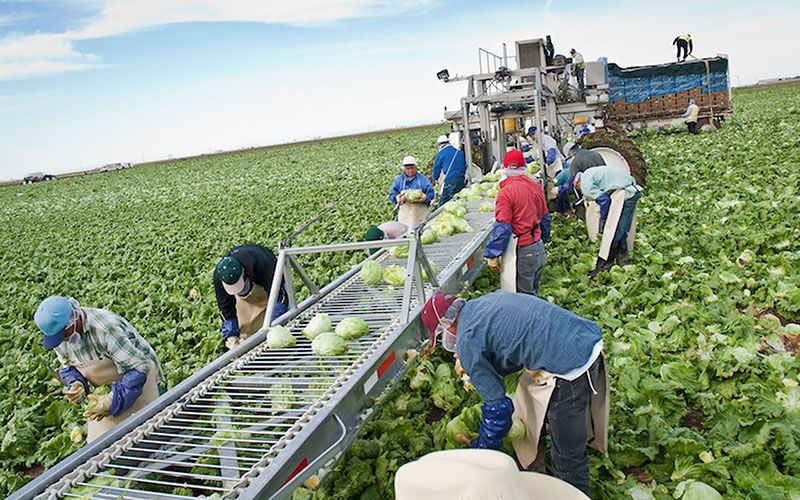
Farmworkers harvest lettuce in Yuma in this 2012 file photo. New federal regulations aim to protect farmworkers from pesticide exposure, but some farm groups wonder if regulations are necessary. (Photo by Michel Duarte/Cronkite Borderlands Initiative)
WASHINGTON – The federal government outlined new safety measures Monday that would protect farmworkers from pesticide exposure by banning pesticide use by minors and sharply increasing training requirements, among other changes.
The final regulations, which would take effect in 60 days and be phased in over the next two years, are the first changes to the Worker Protection Standard in more than 20 years, said officials from the Environmental Protection Agency and the Department of Labor who announced the new rules.
The changes are meant to foster a healthier environment for farmworkers said EPA Administrator Gina McCarthy in the conference call announcing the changes, adding that it is her agency’s job to ensure that farmworkers “have fair, equitable working standards.”
Farm groups in Arizona said they were still studying the new rules, but were skeptical about the need for the changes.
“We don’t need to be adding regulations just to be adding regulations,” said Joe Sigg, director of government relations for the Arizona Farm Bureau. “The EPA should show why we need those regulations.”
Arizona Farm Bureau President Kevin Rogers also questioned the need for additional protections.
“We want to make sure that our employees that work on our farms and ranches are safe,” Rogers said. “But some of these are the same chemicals home owners can go buy at Home Depot.”
Besides prohibiting pesticide use by any farmworker under age 18, the new rules would increase mandatory pesticide training for farmworkers from once every five years to once a year.
Also included in the revisions is an anti-retaliation provision that is comparable to those introduced by the Labor Department for other industries, according to the EPA website on the rule. The stipulation is meant to protect whistleblowers who shed light on safety concerns on farms.
“We intend to play a very aggressive role in ensuring not only are these rights out there, but that they are known by the community,” Labor Secretary Thomas Perez said during the conference call.
He said the revisions are necessary to keep farmworkers safe and well informed of their rights.
“It’s hard to exercise your rights if you don’t know of their existence,” Perez said. “Our goal is to bring them out of the shadows and into the sunshine.”
Rep. Raul Grijalva, D-Tucson, hailed the changes that he said will “protect millions of farmworkers today, and millions more in the future.”
“For the first time in more than two decades, EPA is taking steps today to ensure millions of farmworkers and their families won’t face unknown health hazards simply for showing up for work each day,” Grijalva said in a statement released by his office. “This long-fought victory˜belongs to those workers and coalitions who fought to have˜their voices heard.”
The EPA estimates that there are about 1.9 million agriculture workers and handlers in the nation.
Arturo Rodriguez, president of United Farmworkers, applauded the revisions, calling the announcement “a dream come true,” particularly praising the minimum age requirement.
“It’s so critical now that we will no longer allow children to apply pesticides,” said Rodriguez, who was on the conference call. “Today, we can say that most of the same rules that have protected other American workers … are finally going to protect farmworkers.”